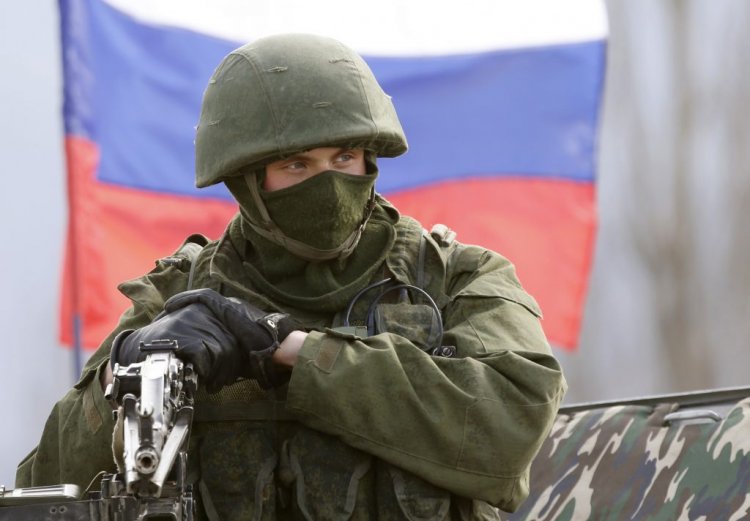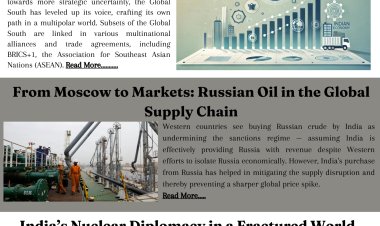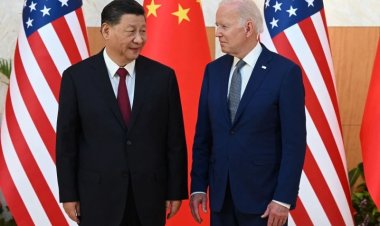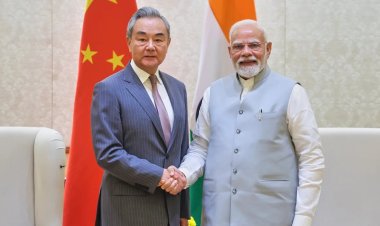The Geopolitics of Energy Vulnerability of Europe and Russia-Ukraine Strategic Conflict
The present geopolitical conflict between Russia and Ukraine is going to have a major impact on the energy security of Europe. It will also accentuate the energy vulnerability of Europe to a significant extent. At the same time, all three powers are certainly going to suffer due to the present impasse. For instance, Russia will face a major financial crunch as energy exports to Europe will halt. Similarly, Ukraine will suffer both in terms of losing transit pipeline fees and securing energy. Similarly, Europe will face a shortage of energy and an escalation of energy prices. India is also looking at the strategic developments following the Russia and Ukraine conflict closely.

Analysis
By Dr. Nalin Kumar Mohapatra
While the escalation of conflict between Russia and Ukraine is attracting international attention, one issue which has not been much discussed is the consequences it has on the energy security of Europe. However, these two issues cannot be studied in isolation, as they are interrelated. They are putting a stress on the energy vulnerability of Europe. This situation, within a broader context, is also adding volatility to the existing global energy market.
Historically, Ukraine played a crucial role in the energy supply chain from the then Soviet Union to the European countries. In fact, Moscow used to supply energy to the European countries despite the Warsaw Pact, the NATO divide and the Cold War animosity. The Dhruzva pipeline served as the key route for supplying energy to the European countries. However, the situation has not changed much in the post 1991 phase. Ukraine continues to occupy an important role in the Europe and Russia energy trade. But things changed substantially following the colour revolution in Ukraine and installation of a pro-Western regime in Kiev much to the disdain of Moscow. The change in regime and growing support from the Western countries to Ukraine, has also impelled a new form of geopolitical contestation in the context of space and resources in this part of the world.
Russia is the third largest producer of oil, and the second largest in terms of gas, as per the Energy Information Administration (EIA) 2021 study. It is also true that Russia is highly dependent on energy export to earn foreign exchange. These exports are sustaining the country’s economy. The above study also suggests that because of the OPEC+ consensus, Russia has increased its energy production by 11.0 million to 11.5 million barrel per day starting in May 2022. It may be underlined here that though China is one of the major consumer of Russian oil and gas, European countries are also traditionally major importers of Russian energy. In this context, one can envisage the significance of Ukrainian route as a major transit corridor for supply of Russian energy. Russia’s energy sector’s export is already suffering a major glut because of a global recession following the pandemic. In 2020, there was a massive reduction of Russian oil exports to the global market, to the tune of 20.6 percent, according to the Trade Policy Review on Russia, a report prepared by World Trade Organisation (WTO) and published in 2021.
The energy imports (in terms of gas) of European countries from Russia range from 43.9 percent in 2020, to 46.8 percent in the first quarter of 2021. Similarly, Russian oil imports accounts for 25.5 percent in 2020 and 24 .4 percent in the first quarter of 2021. Russia’s importance to the EU countries in terms of energy supply is evident. Despite EU’s ambitious program of reducing carbon footprint and achieving self-sufficiency in energy through clean energy, the importance of conventional sources of energy in terms of oil and gas cannot be diminished. Because of the high dependency on Russian energy, some of the major European countries like Italy, France and Germany favoured strong partnership with Russia and resisted any sanctions against it from their Western partners. It is in this context that one must study the present geopolitical impasse between Russia and Ukraine.
In the geopolitical framework of analysis, one has to keep in mind two important points while locating Ukraine within the Russia-EU energy relations. Firstly, Ukraine is an important connecting point between Russia and Europe in the energy trade. Secondly, one has to account for the geopolitical camouflage arising from isolating Ukraine through the alternative trade between Russia and EU. It may be argued that these two issues are complicating the energy insecurity of Europe.
Despite bitter conflict between Russia and Ukraine since the Crimean fiasco, there was an agreement between Russia and Ukraine as part of providing gas to Europe. The deal was informally struck in 2019 at the political level, and later formalized through the Norman Day Four Agreement - France, Germany, Russia and Ukraine. As part of the agreement, there was a consensus that Gazprom, the Russian energy giant, and NeftaGaz, the Ukrainian energy firm, would transfer 65 billion cubic meters of gas per day to Europe through Ukraine.
Though this agreement promised for safe transit of Russian energy, the present crisis between Russia and Ukraine is putting indirect stress on the energy insecurity of Europe. The impact is evident from the energy crisis Europe is experiencing, with Russia and Ukraine both suffering financially. Russia is suffering in terms of export earnings, and Ukraine is affected by losing transit fees earning and a sharp rise in domestic energy prices. As stated by Fatih Birol, the Director of International Energy Agency, (IEA) “today’s low Russian gas flows to Europe coincide with heightened geopolitical tensions over Ukraine.”
There are two simultaneous developments affecting Russian and Ukrainian relations with the EU, in terms of the energy security geopolitics of this region. Firstly, the alternative routes being developed, namely Nord Stream pipeline project through Baltic Sea and the second one is the Euro-Asian Oil Corridor Project. The latter project aims at transporting the Caspian oil to the European countries through Ukraine via Black Sea. As has been stated the main objective of this pipeline is to pump 40 million tons of oil to Europe. If this materialises, it will dent Russia’s energy dominance in Europe by a significant degree. At the same time, the Nord Stream project provides an opportunity to bypass Ukraine while supplying Russian energy to Germany. These two pipeline projects are adding to the existing geopolitical and energy security complexity in the region.
Due to the current energy crisis, the price of gas is soaring in Europe. Even Germany is facing pressure from its Wester partners in terms of accessing energy through the Nord Stream II pipeline route.
The Ukraine’s domestic energy crisis is also being accentuated over the Russia- Ukrainian conflict. For instance Ukraine is depending heavily on Russian coal to sustain its economy. However, the crisis with Moscow is putting Kiev in crisis as where to secure coal. It may be noted that most of the coal reserves are in the Donbass region. However, the present crisis in the Donbass region is impeding the supply of energy to Ukraine.
The loss of transit fees is another worry for the Ukrainian government, as discussed before. In its report, the IEA states that in 2019 Ukraine received around 2-6 billion dollars from Russia as part of energy transit fees. As the supply is now reduced from Russia through Ukraine this is putting additional strain on Ukraine’s financial system. It is in this broader geopolitical context that one has to look at the present Russia-Ukraine crisis.
At the strategic front the factors shaping the structural geopolitical framework of this part of Eurasia are: the zero-sum nature of the conflict between Kiev and Moscow; the role of the outside powers in the form of NATO aiding the Ukraine; its spill over effect particularly on the Black Sea Region which is continuously becoming the flashpoint of the strategic manuverability. All these factors are keeping the geopolitical climate of this part of the world in a tense situation.
As reported, the United States and other Western allies are rushing their military aid to Ukraine. This is altering the geopolitical situation to a certain extent, by pitting the two Cold War era adversaries, Russia and the West, against each other once again. Russia is also preparing itself to face the crisis situation in its border by stationing both arms and soldiers. It is in this background that one has to think of the seriousness of the crisis. The neighbouring European countries are also going to be affected by the present geopolitical limbo.
In the context of the previous analysis, one must examine the likely implications of the Russo-Ukrainian crisis on the energy geopolitics on the following aspects:
- The present Russo-Ukrainian crisis will accentuate Europe’s energy vulnerability in terms of supply. Russia’s foreign exchange earnings will be affected, and Ukraine will face financial loss and worse domestic energy security due to lower access to coal.
- The crisis is going to have a deeper impact on the Black Sea region as this will be the flashpoint for geopolitical contestation.
- The energy transportation particularly from the Caspian region to the EU countries will also be affected because of the militarization of the Black Sea.
- The present impasse will also contribute to the existing volatility in the international energy market. Already prices are increasing for crude oil and conventional sources of energy in the international market.
- Russia-Ukraine conflict will also give Turkey a preponderant role, considering it is a historical nemesis of both the countries in the region. This may also contribute to greater radicalisation, as Turkey will pursue its radical Islamist agenda which in turn will have an impact on internal security of Russia.
India is looking cautiously to the developments of the Russia-Ukraine tension. Though the Moscow-Kiev strategic wrangling will not have a direct bearing on New Delhi, but there may be some indirect implications. This is due to the rise in crude prices in the international market. As India is importing oil and gas from external markets, any rise in the prices will have an impact on the domestic economy. Secondly, over the years, India has been maintaining a delicate balance in relations with the US and Russia. In this context, India should pursue an active policy of defusing the crisis between Russia and the US and Ukraine. The spiralling conflict in this part of Eurasia can cause “a new Cold War syndrome” in the global politics.
Similarly, India is also envisaging keen interest in the Black Sea Region. The INSTC route along Chahbahar Port will play a major role in connecting India with the post-Soviet Eurasia. The same route can be extended by connecting with Georgia and other Black Sea countries through the proposed transit route between Iran with Georgia via Armenia. The test run for this route will start from March 2022. This will expand India’s sphere of influence in terms of trade and connectivity with the Black Sea region along with direct access to the European and Post-Soviet market. However, the present strategic conflict between the two Black Sea Region countries (Russia and Ukraine) may have an impact on the security and stability of the region.
A closer look at the developments in the Russia-Ukraine conflict demonstrates that it is contributing to the uncertainty on the strategic front as well as on the the energy supply chains. In fact, as discussed, all three players – Russia, Ukraine, and the European countries – will suffer due to the present volatility. These developments are bound to affect the global supply chain in terms of energy. Russia and Ukraine should adopt a pragmatic policy which can address the major irredentism. The European countries should also play a major role in defusing the present crisis as this can enhance their sustainable energy security.
Disclaimer: This paper is author’s individual scholastic contribution and does not necessarily reflect the organization’s viewpoint.




















